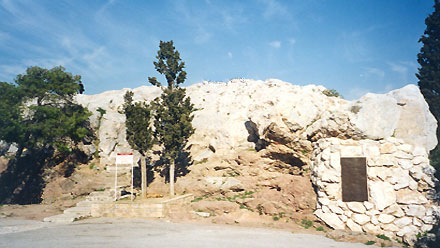.jpg/280px-V%26A_-_Raphael%2C_St_Paul_Preaching_in_Athens_(1515).jpg) |
| Areopagus Sermon, by Rafael, 1515. |
Therefore, since we are the offspring of God, we ought not to think that the Divine Nature is like gold or silver or stone, something shaped by art and man’s devising. Truly, these times of ignorance God overlooked, but now commands all men everywhere to repent, because He has appointed a day on which He will judge the world in righteousness by the Man whom He has ordained. He has given assurance of this to all by raising Him from the dead.” And when they heard of the resurrection of the dead, some mocked, while others said, “We will hear you again on this matter” (Acts 17:29-32).
Paul demonstrates here what he means when he writes to the Corinthians that the message of the cross is foolishness to those who are perishing. Paul spends his time in Athens talking to the philosophers and thinkers, preaching the death and resurrection of Jesus. God works through His preached word. He wants all men to be savers and to come to the knowledge of the truth. So, He brings the means of grace to the people of Athens through Paul.
 |
| The Areopagus today. |
The Athens in which Paul was preaching looks a lot like the society and culture in which we live today. We may not speak Greek or wear togas, but those types of things are only superficial. Paul looked around at Athens and saw a city filled with idolatry. We too are indeed very religious. We don’t worship statues of the gods of Olympus, but we are the same type of idolaters as the ancient Athenians nevertheless. We, like them, and like all of mankind since the Fall don’t fear, love, and trust in God above all things. We are curved inward on ourselves. We have made ourselves our god, the object of our worship. The Greeks carved images out of stone to represent their gods, but they all suspiciously had the characteristics of men. Those gods were proud, they were jealous, they were vain and capricious. They blessed you when you pleased them, and they punished you when you offended them, generally speaking. They understood quid pro quo.
Today, we may not have giant statues of Zeus in the center of our towns, but we don’t need them. We do just fine worshipping ourselves without the formal paganism. The worship of self is characterized by man feeling some vague need for redemption, and trying to assuage that feeling by some outward act or work. We spend our days sacrificing to the idol of self our time, our talent, and our treasure, to borrow the language of Christian stewardship. We don’t sacrifice animals to the gods, but we do sacrifice just about everything else to try and please the god of ourselves.
Paul’s preaching of the law, however, shows us what is really important. God, the true God, is not far from us. We are so curved inward on ourselves that we can’t see Him. And, as Paul said, “Truly, these times of ignorance God overlooked, but now commands all men everywhere to repent, because He has appointed a day on which He will judge the world in righteousness by the Man whom He has ordained. He has given assurance of this to all by raising Him from the dead.” Some mocked Paul, when they earn him speak of the resurrection of the dead, just as they do today. Their sinful minds remain hostile to God; they cannot understand the spiritual things because they are stiff-necked, and always resist the working of the Holy Spirit.
But Christ comes to us in His Word and Sacraments. Through His word, He works repentance for our sins and faith in His promise of redemption in us. Through faith in Christ, He makes us sons of God and heirs of the promise. Through baptism, the washing of regeneration through water and the word, Christ clothes us with Himself and joins us to His death and resurrection. Let us be among those who, upon hearing the Gospel, wanted to hear more, who joined Paul, who believed, and who grow in the grace and knowledge of our Lord and Savior Jesus Christ.
No comments:
Post a Comment